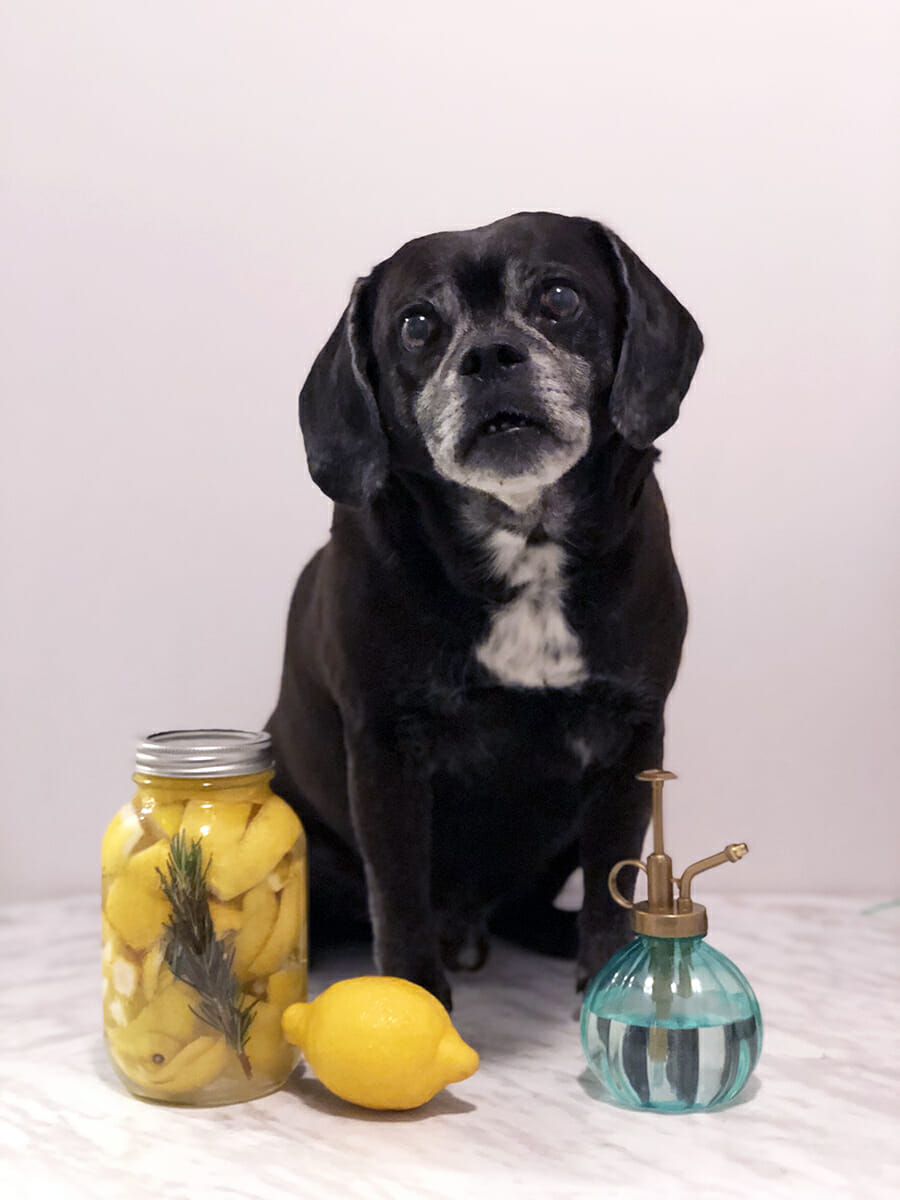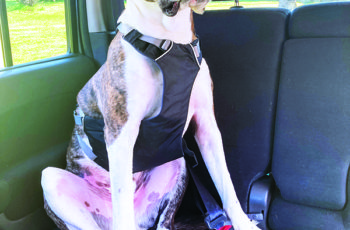As a member of the Etsy affiliate program and an Amazon Associate, I earn from qualifying purchases.
I know it seems like one of those “crunchy” things to do, but I have been making my own cleaning spray for years.
It all started with Felix. My sweet boy was allergic to pretty much everything and I noticed that he would often lick at his paws after I mopped the floors. Real-talk, I’m not 100% sure he should have been ingesting the cleaners I was using. And the floor cleaner wasn’t the only one; lots of common cleaners are toxic to pets. So, I started making my own DIY Cleaning Spray that wasn’t just pet-friendly, but also super easy, really cheap and can be used in lots of ways. I used to have one product for floors, another for counters, and another for windows, now I’m just using my homemade all-purpose cleaning spray made with white vinegar for almost everything.

Almost. Vinegar is an acid, so it does have the power to damage sensitive surfaces. I would avoid using a vinegar-based cleaner on natural stones, such as granite or marble, and I would probably avoid using it on natural wood floors as well. It’s also not great on waxed furniture, electronics, unsealed grout, or aluminum. But I use it on all my laminate counters, all my Ikea furniture, on the fixtures and in the bathroom, on windows and my mirrors, etc. It’s great for dealing with water stains and for cutting through grease and it’s an excellent fabric refresher between washes.


When cleaning your dog-friendly home, it’s important to use cleaners that will not irritate your dog. This DIY Infused Vinegar cleaning spray is my go-to all-purpose dog-friendly home cleaning spray. I use it anytime that I want to clean, but disinfection is not necessary.
Prep Time 5 minutes
Active Time 5 minutes
Additional Time 14 days
Total Time 14 days 10 minutes
Difficulty Easy
Materials
- Cleaning vinegar
- 5 – 6 Lemon worth of peels
- Fresh Rosemary sprigs
Tools
- 1 Mason Jar
- 1 spray bottle
Instructions
- Peel the lemons and place them in your jar, along with a couple of sprigs of fresh rosemary.
- Cover peels with distilled vinegar, seal the jar and place in the fridge for 2 weeks. (You can technically use it at any time, but I find giving it a good long soak makes the lemon scent really pop.
- After 2 weeks, remove the peels and the rosemary, then mix 50/50 with distilled water in your spray bottle.
- Use to clean hard surfaces, windows, or to mist fabrics that need a pick me up.
Notes
*I usually juice the lemons for use in my tea

Frequently Asked Questions about using dog-safe infused vinegar cleaner
1. Can I use regular white vinegar instead of cleaning vinegar? What is “Cleaning vinegar” anyway?
You can totes use regular white vinegar in this DIY cleaning spray recipe, but it might not work as well. Regular vinegar is 5% acetic acid by volume; cleaning vinegar is 6% acetic acid by volume. I know one measly percent difference doesn’t SOUND like much, but I swear it does make a difference especially on tough grime, like soap scum, that really needs that extra kick to cut through it.
2. Does vinegar clean and disinfect?
Yes and also no. Vague, right? Vinegar-based cleaners are not an approved disinfectant, but vinegar does have some disinfecting properties. Vinegar can help reduce or eliminate several common food pathogens, like salmonella, but it doesn’t work on all bacteria and it definitely doesn’t work on viruses. Disinfectants are chemicals that are proven through testing to destroy or inactivate bacteria and/or viruses on surfaces and vinegar just hasn’t made the cut yet. The EPA has a great list of disinfectants that are registered and proven to work for those times when you really need a disinfectant.
Never mix bleach and vinegar or hydrogen peroxide with vinegar; the fumes are toxic.
2. Some vinegar-based cleaners have castile soap in them, why doesn’t this one?
Little known fact: mixing vinegar and castile soap together is a pricey waste of time and supplies. Actually, castile soap, which is a base, shouldn’t be mixed with any acid. What happens when you do? Well, the vinegar reduces the castile soap back to its original oils. You’ve basically cancelled out all the best parts of both ingredients. I find the resulting cleaner leaves oily streaks everywhere. If you want to use soap, I’d clean once with the soap mix, then wipe after with the vinegar mix to remove residue, instead of trying to use them together.

3. I heard lemon oil is bad for dogs, is this safe lemon peel cleaner safe to use?
I think it’s important to distinguish between lemon essential oil and the lemon oil found naturally in the peel. Essential oils have extracted and distilled, so they are concentrated. The lemon that infuses into your cleaner is much less concentrated than the lemon in a bottle of essential oil. I wouldn’t let my dog drink this cleaner and I wouldn’t spray it into his fur, but I feel perfectly safe cleaning with it since I’m wiping the excess up with my cleaning cloth/mop etc.
4. Doesn’t cleaning with vinegar make the house smell?
This was honestly my biggest worry when I started cleaning with vinegar. I was certain the house would smell like salt & vinegar chips and THEN WHAT?! The lemon helps brighten the acidity of the vinegar and the rosemary adds some lovely herb notes, but you are going to smell the vinegar a little. The good news is that the vinegar smell dissipates as soon as the surface is dry – and over the years, I’ve actually come to love it. It smells fresh and clean and I much prefer it to the artificial scent of most commercial cleaners.


